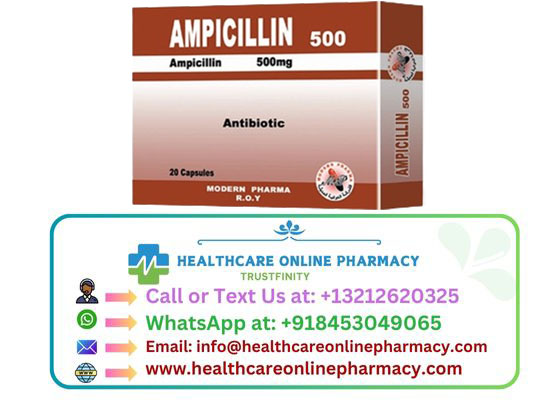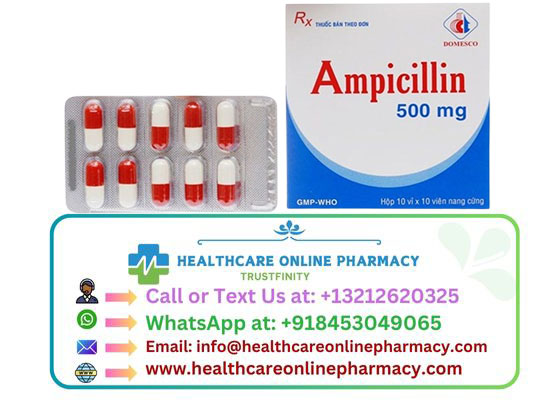Ampicillin is a broad-spectrum antibiotic used to treat a variety of bacterial infections. It belongs to the penicillin class of antibiotics and works by inhibiting bacterial cell wall synthesis, thereby killing the bacteria. Ampicillin is effective against infections such as respiratory tract infections, urinary tract infections, gastrointestinal infections, and meningitis. It is commonly administered orally or intravenously, depending on the severity of the infection.
All Category
- 5-Alpha Reductase Inhibitors.
- A CORTICOSTEROID,
- A MEDICINE USED IN THE TREATMENT AND PREVENTION OF OSTEOPOROSIS IN POSTMENOPAUSAL WOMEN.
- ACETYLCHOLINESTERASE INHIBITORS, NMDA RECEPTOR ANTAGONISTS
- ACUTE MIGRAINE HEADACHE.
- Allergic
- Allergic reaction
- ALPHA BLOCKER
- AN ANTICOAGULANT.
- AN ATYPICAL ANTIPSYCHOTIC
- Analgesics And Antipyretics
- ANDROGEN
- ANTI ALZHEIMER
- ANTI MIGRAIN
- Anti-Anxiety
- ANTI-DEPRESSANTS
- ANTI-EMETICS AND PROKINETIC AGENTS
- Anti-epileptic
- Anti-Fungal Medicine
- ANTI-NEOPLASTIC AGENTS'
- ANTIBIOTIC
- Antibiotic /Infections
- Anticonvulsants
- ANTICONVULSANTS CLASS OF MEDICINES.
- ANTIDEPRESANT
- ANTIEMETICS
- ANTIEPILEPTIC MEDICATION
- ANTIESTROGEN
- Antifungals
- ANTIHISTAMINES
- Antimalarial Medicine
- Antiparasitic
- ANTIPYRETIC
- ANTIVIRAL MEDICATION
- Attention Deficit Hyperactivity Disorder (ADHD)
- B1 PREGNANCY DRUG
- BACTERIAL INFECTIONS
- BENZODIAZEPINES
- BETA BLOCKER
- BETA2-ADRENERGIC AGONIST
- BLOOD PRESSURE
- Breast Cancer
- CARISOPRODOL, CAFFEINE AND PARACETAMOL
- CEPHALOSPORINS
- Class Of Antibacterial.
- Common Hereditary Hair Loss
- COX-2 INHIBITORS
- DEPRESSION AND OTHER MENTAL HEALTH CONDITIONS
- Diclofenac
- DILATION OF THE BRONCHIAL MUSCLES.
- Diuretics Or Water Tablets
- Dpp-4 Inhibitors
- Epilepsy/Seizures
- Erectile Dysfunction
- Errectile Disfunction & Pulmonary Hypertention
- FAT BURNING
- FEMALE SEX ENHANCEMENT DRUG
- FEMALE SEX HORMONE (ESTROGEN).
- Fluoroquinolone Antibiotics
- Gastroesophageal
- GASTROINTESTINAL
- HAIR GROWTH FORMULATION
- Health Supplement
- Hypertension (high blood pressure)
- Hypothyroidism
- Immunity Booster
- Infection
- INSOMINIA MEDICATION
- Inti-Fungal
- MACROLIDE ANTIBIOTICS
- MEDICINE USED TO REDUCE PRESSURE IN THE EYES
- Muscle Relaxant
- MUSCLE RELAXER
- Muscular Pain
- Narcolepsy (sleep disorder )
- Nausea
- NEUROLEPTIC
- Neuropathic pain
- NON-STEROIDAL FERTILITY MEDICINE.
- NONBENZODIAZEPINE HYPNOTIC
- NONBENZODIAZEPINE HYPNOTIC.
- NSAID (A NON-STEROIDAL ANTI-INFLAMMATORY DRUG)
- OPIOID ANALGESICS.
- OVULATORY STIMULANTS.
- PAIN KILLER
- Pain Relief
- Pde5 Inhibitors
- PENICILLIN-TYPE OF ANTIBIOTIC
- PEPTIC ULCER
- PHOSPHODIESTERASE TYPE 5 INHIBITOR.
- PROTON PUMP INHIBITORS
- Reduce The Swelling (Edema) Caused
- RESOLVE THE PROBLEM OF ERECTILE DYSFUNCTION IN MEN.
- SEDATIVE-HYPNOTIC
- SEDATIVE-HYPNOTICS
- Selective Estrogen Receptor Modulator (Serm)
- SELECTIVE NOREPINEPHRINE
- SELECTIVE SEROTONIN REUPTAKE INHIBITOR (SSRI)
- SEROTONIN MODULATORS
- SEVERE ACNE
- SKELETAL MUSCLE RELAXANT
- Skin Care
- STATINS
- STEROID
- SULFONAMIDES
- SYNTHETIC ANTIANDROGEN
- SYNTHETIC ESTROGEN DERIVATIVE
- TETRACYCLINE ANTIBIOTIC
- THE ANTICONVULSANTS CLASS OF MEDICINES.
- THE TREATMENT OF ACUTE ATTACKS OF MIGRAINE.
- THE TREATMENT OF ALCOHOL ADDICTION
- TO RELIEVE SYMPTOMS OF ELARGED PROSTATE GLAND (BENIGN PROSTATIC HYPERPLASIA OR BPH).
- Treat Male Sexual Function problems
- Treating Impotence in Men
- TREATING PREMATURE EJACULATION.
- TREATMENT OF INSOMINIA
- TREATMENT OF MALE HYPOGONADISM CAUSED DUE TO LOW TESTOSTERONE LEVELS.
- TRICYCLIC ANTIDEPRESSANT
- Type 2 Diabetes
- USED FOR MUSCLE RELAXATION.
- USED FOR THE TREATMENT OF INFERTILITY IN WOMEN
- Used to Treat Erectile Dysfunction (Impotence) and Symptoms of Benign Prostatic Hypertrophy (Enlarged Prostate).
- VARIETY OF BACTERIAL INFECTIONS
- Weight Loss
- More Category
- Vriligy
- Vilitra
- Super Vilitra
- Snovitra Xl
- Snovitra Super Power
- Snovitra Strong
- Snovitra
- Prejac
- Poxet
- Kamagra Chewable
- CENFORCE FM
- KAMAGRA ORAL JELLY
- KAMAGRA ORAL JELLY WOMEN
- SUPER KAMAGRA ORAL JELLY
- VEGA EXTRA COBRA
- LOVEGRA ORAL JELLY
- FILAGRA ORAL JELLY
- SUPER P-FORCE ORAL JELLY
- MALEGRA ORAL JELLY
- FILENA XXX
- MAHAGRA
- SILDIGRA XL PLUS
- SILDIGRA SOFT CHEWABLE
- SILDIGRA GOLD
- SILDIGRA
- MAXGUN
- MALEGRA
- SUPER KAMAGRA
- KAMAGRA EXPORT
- KAMAGRA
- FEMALEGRA
- COBRA
- BEGMA
- AYURMAX
- CAREFORCE
- KAMAGRA CHEWABLE TABLETS
- SEXFORCE ORAL JELLY
- SEXFORCE
- SILVITRA
- SILDIGRA SUPER POWER
- SUPER P FORCE
- EXTRA SUPER P FORCE
- VIGORE
- VEGA
- SILAGRA
- MALEGRA DXT PLUS
- KAMAGRA GOLD
- ERIACTA
- FILDENA EXTRA POWER
- VIDALISTA PROFESIONAL
- VIDALISTA CT
- VIDALISTA BLACK
- VIDALISTA Yellow
- TASTYLIA
- Tadora
- TADARISE PRO
- TADALIS SX
- TADAFLO
- TADACIP
- FEMALE UP
- SILDALIST
- Tadavar
- Tadasoft
- Tadalista Super Active
- Tadalista
- Tadagra Strong
- Tadagra Soft
- Tadagra Professional
- Tadagra Chewable
- Tadagra
- Tadaga Super
- Tadaga Power
- Tadaga
- Super Vidalista
- Super Tadapox
- Super Tadalista
- Sildalist Strong
- Super Tadarise
- Extra Super Tadarise
- Tadaday
- SILDAY
- LOVEGRA ( SILDENAFIL )
- SUHAGRA
- Tadarise
- FILDENA
- Vidalista
- Cenforce
- Super Fildena
- Tadapox
- Malegra FXT
- Fildena Double
- Fildena Super Active
- Aurogra
- Sildamax
- Apcalis oral jelly
- Tadalis
- Vriligy
- Vilitra
- Super Vilitra
- Snovitra Xl
- Snovitra Super Power
- Snovitra Strong
- Snovitra
- Prejac
- Poxet
- Kamagra Chewable
- CENFORCE FM
- KAMAGRA ORAL JELLY
- KAMAGRA ORAL JELLY WOMEN
- SUPER KAMAGRA ORAL JELLY
- VEGA EXTRA COBRA
- LOVEGRA ORAL JELLY
- FILAGRA ORAL JELLY
- SUPER P-FORCE ORAL JELLY
- MALEGRA ORAL JELLY
- FILENA XXX
- MAHAGRA
- SILDIGRA XL PLUS
- SILDIGRA SOFT CHEWABLE
- SILDIGRA GOLD
- SILDIGRA
- MAXGUN
- MALEGRA
- SUPER KAMAGRA
- KAMAGRA EXPORT
- KAMAGRA
- FEMALEGRA
- COBRA
- BEGMA
- AYURMAX
- CAREFORCE
- KAMAGRA CHEWABLE TABLETS
- SEXFORCE ORAL JELLY
- SEXFORCE
- SILVITRA
- SILDIGRA SUPER POWER
- SUPER P FORCE
- EXTRA SUPER P FORCE
- VIGORE
- VEGA
- SILAGRA
- MALEGRA DXT PLUS
- KAMAGRA GOLD
- ERIACTA
- FILDENA EXTRA POWER
- VIDALISTA PROFESIONAL
- VIDALISTA CT
- VIDALISTA BLACK
- VIDALISTA Yellow
- TASTYLIA
- Tadora
- TADARISE PRO
- TADALIS SX
- TADAFLO
- TADACIP
- FEMALE UP
- SILDALIST
- Tadavar
- Tadasoft
- Tadalista Super Active
- Tadalista
- Tadagra Strong
- Tadagra Soft
- Tadagra Professional
- Tadagra Chewable
- Tadagra
- Tadaga Super
- Tadaga Power
- Tadaga
- Super Vidalista
- Super Tadapox
- Super Tadalista
- Sildalist Strong
- Super Tadarise
- Extra Super Tadarise
- Tadaday
- SILDAY
- LOVEGRA ( SILDENAFIL )
- SUHAGRA
- Tadarise
- FILDENA
- Vidalista
- Cenforce
- Super Fildena
- Tadapox
- Malegra FXT
- Fildena Double
- Fildena Super Active
- Aurogra
- Sildamax
- Apcalis oral jelly
- Tadalis









